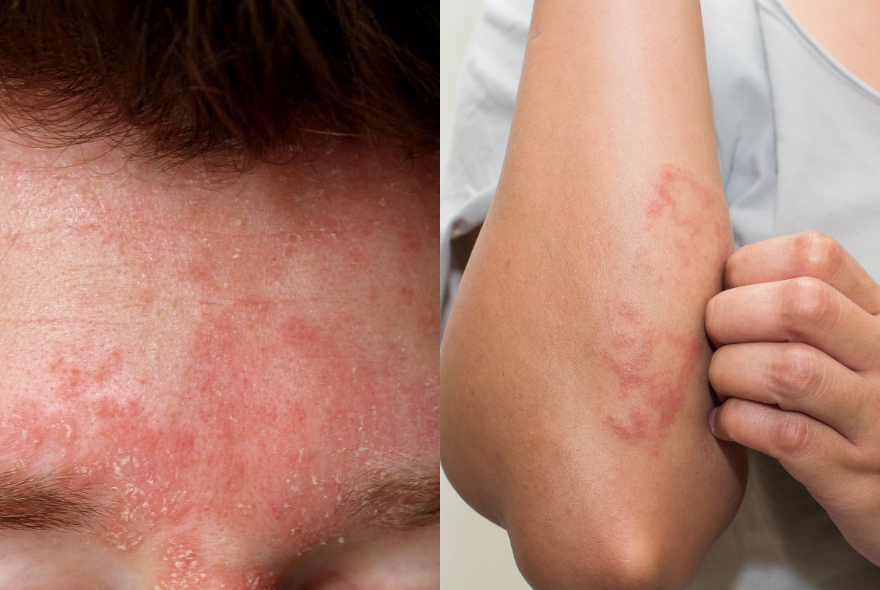
In the shadow of the security situation and ongoing mental stress: More and more Israelis are reporting new skin problems or worsening of existing conditions - redness, irritation, scaling, peeling and a general feeling of discomfort.
According to Dr. Lehavit Ackerman, a dermatologist, in many cases it is an outbreak of seborrheic dermatitis – an inflammatory and chronic skin disease that tends to worsen in stressful situations, even if the person themselves do not define themselves as “experiencing stress.”
“The body feels what the mind doesn’t always perceive,” explains Dr. Ackerman. “Continued alertness, lack of sleep, prolonged stay in protected spaces or a feeling of lack of control – all of these can be considered triggers in the eyes of the body, and cause hormonal changes such as increased cortisol levels. The result: damage to the skin’s protective barrier, redness, sensitivity and even the outbreak of chronic skin diseases.”
She says skin symptoms from stress can appear within a few days, and sometimes even faster – especially in those who have dealt with similar skin problems in the past. “The skin is often the first place the body signals to us that something internal is amiss.”
Which skin conditions may worsen during times of stress?
Seborrheic dermatitis
A chronic disease that manifests itself in redness, peeling, and scaling, mainly on the face and scalp. Common during transitional periods and stressful situations.
What to do? It is important to maintain a daily skin care routine with appropriate products, and to seek the help of a dermatologist who will recommend topical medication when necessary. Maintaining good hygiene, a balanced diet, and reducing stress help to maintain the skin.
Psoriasis (scaly skin)
An autoimmune disease that manifests as red, scaly lesions. Emotional stress may worsen the outbreak or even trigger the initial appearance of the disease.
What to do? Contact a dermatologist for appropriate preparations. If necessary – light therapy, systemic or biological medications. Exercise and breathing exercises can serve as effective complementary treatment.
Atopic dermatitis (skin asthma)
Dry, irritated, and itchy skin – common in children but also occurs in adults. Worsening is common during times of stress.
What to do? Daily lubrication of the skin, avoiding contact with irritating substances, and using specialized products. In severe cases – drug treatment as recommended by a doctor.
Acne (pimples)
Stress increases hormone levels, which encourages the appearance of pimples.
What to do? Maintain hygiene, use non-oily products, avoid putting pressure on the wounds. Medical treatment as needed, including ointments, antibiotics, or advanced treatments.
Urticaria (nettle rash)
An itchy rash that appears and disappears intermittently – sometimes solely on an emotional basis.
What to do? Personalized antihistamine treatment, while trying to identify and reduce stress factors.
Alopecia areata (focal hair loss)
Sudden hair loss in circular areas of the scalp – sometimes due to a distinct emotional background.
What to do? You should see a dermatologist, who may recommend topical steroids or injections. In complex cases, biological treatment can be considered. At the same time, emotional support and calming the body are extremely important.
Excessive sweating (hyperhidrosis)
Especially common in stressful situations and increases the feeling of discomfort.
What to do? There are local medical treatments, including Botox injections. Anxiety treatment may also provide relief.
So what do you do when both your mind and skin are signaling?
•Reduce stress: exercise, mindfulness, breathing, good sleep, and time for ourselves.
•Treat the skin – and the mind: It is important to consult a dermatologist and also consider emotional support when needed.
•Maintain a healthy routine: Persistence in grooming, a balanced diet, and a sense of control are key to coping over the long term.
Courtesy of Dr. Lehavit Ackerman, Dermatologist